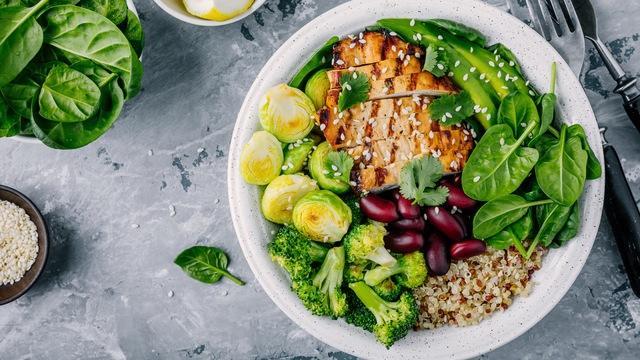
Good health is often associated with how we look and how we feel about ourselves. But with every new diet seeming to offer the best way to lay off extra inches on the waist, you may get confused about the right diet program for your body type. Note that due to differences in individual needs, the strategy that worked for your best friend may not work for you.
On a general note, the best diet plan is the one that is nourishing, healthy, aids weight loss, and does not feel so restrictive that you become miserable. Starving yourself to lose fat is not sustainable, and it’s not healthy either. Below, we have compiled a list of the seven current weight-loss diet trends. Each one has great promise, but a personal dietician would help tailor them to suit your exact health needs.
1. Mediterranean diet
People living around the Mediterranean Sea enjoyed a long life and had lower risks of suffering from cancer and heart diseases. Their secret was an active lifestyle and the healthy foods they eat. As a result, it became a ‘sought for’ and winner diet approach for diabetes control.
There is no calorie counting; instead, intake of fruits, vegetables, whole grains, beans, nuts, olive oil, lean protein, and very little red meat is encouraged for the Mediterranean diet. Also, moderate portions of cheese, red wine, and flavorful herbs and spices are acceptable. Studies have shown that the Mediterranean diet helps with reductions in strokes, cancer, and diabetes prevention.
2. Ketogenic diet
The keto lifestyle takes dieting a notch higher by reducing the carbohydrates to a minimum while replacing them with fat and protein food sources. The diet trend is strict and mostly recommended for those who want immediate results in their weight loss program. It has other health benefits, such as reducing diabetes symptoms and preventing Parkinson’s disease.
On the downside, there is speculation that the ketogenic diet can keep enthusiasts in a constant state of fatigue while increasing the risk of heart and liver diseases. It may also result in weight cycling – a process whereby you lose weight only to gain more after a while.
3. DASH diet
Although it was not specially designed as a weight-loss diet, the DASH (Dietary Approaches to Stop Hypertension) model may yield some positive results in your weight loss program. Like the Mediterranean diet, it focuses on whole grains, lean protein, vegetables, and fruits. However, it requires a cut-back on saturated fat, meat, sweets, snacks, and salt (sodium) intake.
The DASH diet is excellent for lowering cholesterol and blood pressure levels while reducing your chances of becoming diabetic or having a stroke. Another benefit of DASH is that the food options are healthy, easily accessible, and quite affordable.
4. Volumetrics diet
The most significant benefit of the Volumetrics diet is that you do not forfeit any comfort food or snacks. It was developed as a fun way of making people drink more water and eat more fruits and vegetables to maximize their fiber content consumption. The diet is based on the volume of your meals, allowing you to choose just enough food to make you happy and full.
There are no significant downsides to this option except that you may forget to count calories as you try to be satisfactorily full.
5. Flexitarian diet
If a vegan lifestyle is extreme for you, you may consider a plant-based flexitarian diet. It is fun, has no strict meal plans, and steers you towards eating healthy plant-focused meals by allowing you to draw your menu. You also get to substitute some of your animal protein with plant alternatives.
6. Intermittent Fasting diet
Intermittent fasting involves individual cycling between periods of eating nothing or very little and eating regular meals. There are several programs based on either your BMI (body mass index) or body type. A recent study on animals has shown that fasting can cause immunosuppression. Restrictions in this diet trend are on when to eat, rather than what you can eat. Since long periods of fasting can lead to overeating afterward, individuals can end up consuming unhealthy meals merely because they can.
The intermittent Fasting diet is most efficient for people with busy schedules because they do not have to make plans for it. There is minimal cooking and clean-up since you are not eating much. Fasting leads to low blood sugar levels, and as such, diabetic patients are discouraged from this diet trend.
7. The MIND diet
The MIND (Mediterranean-DASH Intervention for Neurodegenerative Delay) diet combines foods from the Mediterranean and DASH diets. It focuses on boosting brain health through a meal schedule that includes leafy greens, berries, whole grains, olive oil, poultry, fatty fish, beans, nuts, and even a daily glass of red wine. The MIND diet has been shown to protect against dementia and help lower the risk of Alzheimer’s disease by about 50 percent in people who adhere to the menu. herbalife vs isagenix can help you to lose weight.
Bringing it all together
Diet trends are helpful, but it is advisable that you look out for and also avoid fad ideas that are not healthy in the long term. If you are still hesitant about following a diet trend, there are alternative ways to lose weight and be generally healthy without actually cutting down your food intake.
- Choose whole grains, legumes, fruits, and vegetables.
- Eat less processed foods and stay hydrated.
- Opt for a calorie-conscious meal kit delivery service.
- Avoid late-night snacking and increase your fiber food consumption.
- Reduce stress triggers, get enough sleep, and exercise regularly.
Remember, the best diet for you should be easy to follow, nutrient-rich, and affordable, resulting in short and long-term weight loss, as desired.